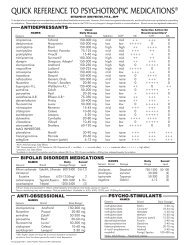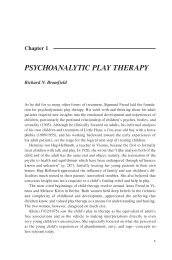IRAQ WAR CLINICIAN GUIDE
Iraq War Clinician's Guide - Network Of Care
Iraq War Clinician's Guide - Network Of Care
Create successful ePaper yourself
Turn your PDF publications into a flip-book with our unique Google optimized e-Paper software.
Iraq War Clinician Guide<br />
PP<br />
1<br />
- --<br />
Executive Summary<br />
I. Executive Summary<br />
The medical, surgical, and psychiatric casualties of Operation lraqi Freedom will receive care from<br />
a broad group of clinicians working in diverse clinical settings. Although most service members<br />
will initially be treated in military treatment facilities, many may find themselves returning to the<br />
United States with conditions that are treated in military facilities, VA Hospitals, civilian treatment<br />
centers, or all of these as they move through their recovery. As a result, some clinicians involved<br />
in treating casualties returning from lraq may not have an understanding of the experiences of the<br />
military patient, the military system in which he or she serves, the military medical services<br />
available, or the potential impact of medical decisions on the service member's future military<br />
career. It is essential that all health care professionals-civilian or military-who care for<br />
casualties from Operation lraqi Freedom have at least rudimentary and relevant military<br />
knowledge.<br />
A variety of factors including personal and cultural characteristics, orientation toward coping with<br />
stressors and painful emotions, pre-deployment training, military-related experiences, and postdeployment<br />
environment will shape responses to Operation lraqi Freedom. Furthermore,<br />
psychological responses to deployment experiences can be expected to change over time. The<br />
absence of immediate symptoms following exposure to a traumatic event is not necessarily<br />
predictive of a long-term positive adjustment. Depending on a variety of factors, veterans may<br />
appear to be functioning at a reasonable level immediately upon their return home particularly<br />
given their relief at having survived the war-zone and returned to family and friends. However, as<br />
life circumstances change, symptoms of distress may increase to a level worthy of clinical<br />
intervention.<br />
Even among those veterans who will need psychological services post-deployment, acute stress<br />
disorder and posttraumatic stress disorder (PTSD) represent only two of a myriad of psychological<br />
presentations that are likely. Veterans of Operation lraqi Freedom are likely to have been exposed<br />
to a wide variety of war-zone related stressors that can impact psychological functioning in a<br />
number of ways. It is important for clinicians to recognize that the skills and experience that they<br />
have developed in working with veterans with chronic PTSD will serve them well with service<br />
members returning from lraq. Clinicians' experience in talking about trauma, educating patients<br />
and families about traumatic stress reactions, teaching skills of anxiety and anger management,<br />
facilitating mutual support among groups of veterans, and working with trauma-related guilt, will<br />
all be useful and applicable.<br />
Chapter II provides an overview of several military-specific topics. First, a brief history of the<br />
evolution and change in the size and components of the military force is discussed, highlighting<br />
the challenges of a highly deployed force that relies on National Guard and Reserve members.<br />
Next, the various types and stages of military conflict are described, with a focus on the specific<br />
stressors that each of these stages might engender. This is followed by an explanation of the<br />
military medical services delivery system, including the different echelons of care of the military<br />
evacuation system. The subsequent section provides a review of psychiatric disorders that often<br />
present during military conflicts. Available psychiatric services are outlined next. Finally, a section<br />
on military decision-making processes focuses on important administrative and medical<br />
procedures that are used to facilitate the evaluation, treatment and management of military<br />
patients with medical and psychiatric conditions.<br />
DEPARTMENT OF VETERANS AFFAIRS<br />
NATIONAL CENTER FOR PTSD




